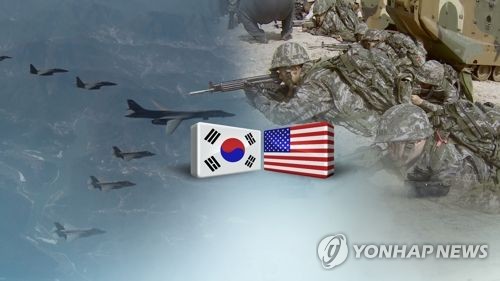- California Assembly OKs highest minimum wage in nation
- S. Korea unveils first graphic cigarette warnings
- US joins with South Korea, Japan in bid to deter North Korea
- LPGA golfer Chun In-gee finally back in action
- S. Korea won’t be top seed in final World Cup qualification round
- US men’s soccer misses 2nd straight Olympics
- US back on track in qualifying with 4-0 win over Guatemala
- High-intensity workout injuries spawn cottage industry
- CDC expands range of Zika mosquitoes into parts of Northeast
- Who knew? ‘The Walking Dead’ is helping families connect
Allies to decide on next year’s combined exercises before Dec. 1: defense minister
WASHINGTON, Oct. 31 (Yonhap) — South Korean Defense Minister Jeong Kyeong-doo said Wednesday that Seoul and Washington will make a decision on plans for next year’s major exercises before Dec. 1 after a working-level review.
Jeong made the remarks after the 50th annual Security Consultative Meeting (SCM) with his U.S. counterpart, James Mattis, where the two sides finalized their decision to suspend the annual Vigilant Ace air exercise originally slated for December.
The suspension is aimed at facilitating ongoing diplomacy to build trust with North Korea, denuclearize it and establish a lasting peace regime on the peninsula.
“For our future major exercises, we (Jeong and Mattis) have discussed today that we will conduct a review from our staff members and have the results of their review until Nov. 15,” Jeong said in response to a reporter’s question of whether the suspension of the combined drills will weaken military readiness.
“We will make a final decision on any major exercises next year before Dec. 1,” he added.
Jeong noted that only some of the major combined exercises and drills have been suspended, as he stressed that the allies’ militaries have been continuously conducting other exercises as well throughout the year.
Mattis echoed his view.
“It’s not like we’ve shut down all the collaborative exercises that we have going on. So we are not right now concerned with a loss of combat capability,” he said.
“Clearly as we go forward we’ll have to make adaptations to ensure we don’t lose that capability but right now again this is not a total suspension of all collaboration and military exercises,” he added.
The suspension of major allied drills has raised concerns that South Korea and the U.S. might have difficulty assessing whether Seoul has the capability to lead combined forces after the transfer of wartime operational control. At the SCM, the allies agreed to conduct a process to certify South Korea’s initial operational capability or IOC next year.
Jeong said that the allies will strive hard to address such concerns.
“We’ll make sure to concentrate all our assets to that process and to make the necessary preparations so that we can effectively and properly carry out the IOC certification, and thereby reassure our citizens there that they do not need to worry about any falls, any decreases, any negative impacts to our military capabilities or our readiness posture,” he said.
Mattis struck a similar note.
“We will give a thorough review, a thorough assessment and it can be done with the staff consultations, it can be done with the staff exercises and we will not lose any capability to deter aggression,” he said.
Asked about if he believes the North’s military threats have decreased significantly enough to continue to suspend major combined exercises, Mattis said that the North’s capabilities still exist even if the threats have been reduced.
“That is why the minister and I talked on every detail about our collaboration. Our goal here is to ensure that our diplomats speak from a position of strength,” he said.
“And we continue to protect the people of the ROK from many threats from the North,” he added, referring to South Korea’s official name, the Republic of Korea.












